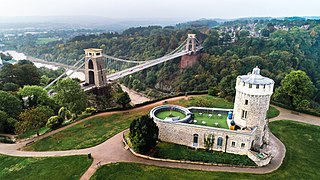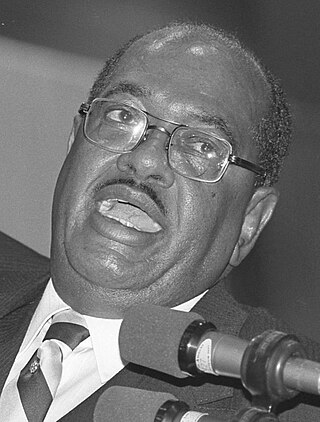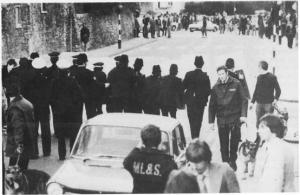
Rosa Louise McCauley Parks was an American activist in the civil rights movement, best known for her pivotal role in the Montgomery bus boycott. The United States Congress has honored her as "the first lady of civil rights" and "the mother of the freedom movement".

Bristol is a city, unitary authority area and ceremonial county in South West England, the most populous city in the region. Built around the River Avon, it is bordered by the ceremonial counties of Gloucestershire to the north and Somerset to the south. The county is in the West of England combined authority area, which includes the Greater Bristol area and nearby places such as Bath.

The Montgomery bus boycott was a political and social protest campaign against the policy of racial segregation on the public transit system of Montgomery, Alabama. It was a foundational event in the civil rights movement in the United States. The campaign lasted from December 5, 1955—the Monday after Rosa Parks, an African-American woman, was arrested for her refusal to surrender her seat to a white person—to December 20, 1956, when the federal ruling Browder v. Gayle took effect, and led to a United States Supreme Court decision that declared the Alabama and Montgomery laws that segregated buses were unconstitutional.

Edgar Daniel Nixon, known as E. D. Nixon, was an American civil rights leader and union organizer in Alabama who played a crucial role in organizing the landmark Montgomery bus boycott there in 1955. The boycott highlighted the issues of segregation in the South, was upheld for more than a year by black residents, and nearly brought the city-owned bus system to bankruptcy. It ended in December 1956, after the United States Supreme Court ruled in the related case, Browder v. Gayle (1956), that the local and state laws were unconstitutional, and ordered the state to end bus segregation.

Edward Colston was an English merchant, slave trader, philanthropist, and Tory Member of Parliament.
St Pauls is an inner suburb of Bristol, England, lying just northeast of the city centre and west of the M32. It is bounded by the A38, the B4051, the A4032 and the A4044, although the River Frome was traditionally the eastern boundary before the A4032 was constructed. St Pauls was laid out in the early 18th century as one of Bristol's first suburbs.

Theodore Judson Jemison, better known as T. J. Jemison, was the president of the National Baptist Convention, USA, Inc. from 1982 to 1994. It is the largest African-American religious organization. He oversaw the construction of the Baptist World Center in Nashville, Tennessee, the headquarters of his convention.
The Montgomery Improvement Association (MIA) was formed on December 5, 1955 by black ministers and community leaders in Montgomery, Alabama. Under the leadership of Ralph Abernathy, Martin Luther King Jr. and Edgar Nixon, the MIA was instrumental in guiding the Montgomery bus boycott, a successful campaign that focused national attention on racial segregation in the South and catapulted King into the national spotlight.

The St Pauls riot occurred in St Pauls, Bristol, England on 2 April 1980 when police raided the Black and White Café on Grosvenor Road in the heart of the area. After several hours of disturbance in which fire engines and police cars were damaged, 130 people were arrested, 25 were taken to hospital, including 19 police and members of the press.

Bristol, a port city in the South West of England, on the banks of the River Avon, has been an important location for maritime trade for centuries.
St. Paul's Carnival is an annual Caribbean Carnival held, usually on the first Saturday of July, in St. Paul's, Bristol, England. The celebration began in 1968 as the St. Paul's Festival, in order to improve relationships between the European, African, Caribbean, and Asian inhabitants of the area.

The Bristol Bus Boycott of 1963 arose from the refusal of the Bristol Omnibus Company to employ Black or Asian bus crews in the city of Bristol, England. In line with many other British cities at the time, there was widespread racial discrimination in housing and employment against so-called "Coloureds". An organisation founded by Roy Hackett and led by youth worker Paul Stephenson as the spokesperson of the group which included Owen Henry, Audley Evans, Prince Brown and Guy Bailey and the West Indian Development Council, the boycott of the company's buses by Bristolians lasted for four months until the company backed down and overturned their discriminative colour bar policy.

Lois Patricia Golding, commonly known as Peaches Golding, is an American-British business executive, administrator, and former academic who is Lord-Lieutenant of the County and City of Bristol. On her 2010 appointment as High Sheriff of Bristol, she was the second Black person and the first Black woman to hold the position. She was appointed Honorary Captain of the Royal Naval Reserves in June 2020.

Marvin Rees is a British Labour Party politician who served as the second and final Mayor of Bristol from 2016 to 2024.
The Tallahassee bus boycott was a citywide boycott in Tallahassee, Florida, that sought to end racial segregation in the employment and seating arrangements of city buses. On May 26, 1956, Wilhelmina Jakes and Carrie Patterson, two Florida A&M University students, were arrested by the Tallahassee Police Department for "placing themselves in a position to incite a riot". Robert Saunders, representing the NAACP, and Rev. C. K. Steele began talks with city authorities while the local African-American community started boycotting the city's buses. The Inter-Civic Council ended the boycott on December 22, 1956. On January 7, 1957, the City Commission repealed the bus-franchise segregation clause because of the United States Supreme Court ruling Browder v. Gayle (1956).
Alfred Fagon was a British playwright, poet and actor. He was one of the most notable Black British playwrights of the 1970s and 1980s. Fagon worked for British Rail and served in the British Army before he wrote and produced plays at theatres across the UK, including Royal Court Theatre and Hampstead Theatre.

The statue of Edward Colston is a bronze statue of Bristol-born merchant and trans-Atlantic slave trader Edward Colston (1636–1721). It was created in 1895 by the Irish sculptor John Cassidy and was formerly situated on a plinth of Portland stone in a public space known as "The Centre" in Bristol, until it was toppled by anti-racism protestors in 2020.

In the United Kingdom, racial segregation occurred in pubs, workplaces, shops and other commercial premises, which operated a colour bar where non-white customers were banned from using certain rooms and facilities. Segregation also operated in the 20th century in certain professions, in housing and at Buckingham Palace. There were no British laws requiring racial segregation, but until 1965, there were no laws prohibiting racial segregation either.
Lurel Roy Hackett MBE was a Jamaican-born activist and long-time civil rights campaigner for the British African-Caribbean community in Bristol, England. He was one of the primary organisers of the Bristol Bus Boycott, which protested against the Bristol Omnibus Company's ban on employing black and Asian drivers and conductors. These events then paved the way for the Race Relations Act of 1965, the first legislation in the UK to address racial discrimination. He was also a co-founder of the Commonwealth Co-ordinated Committee (CCC) which set up the St. Paul's Carnival, a major cultural event in Bristol.
Lawrence Hoo is a poet, educator, and activist residing in Bristol. He is a published author of many books of poetry including Inner City Tales in 2006, HOOSTORY in 2011, and CARGO in 2019.














